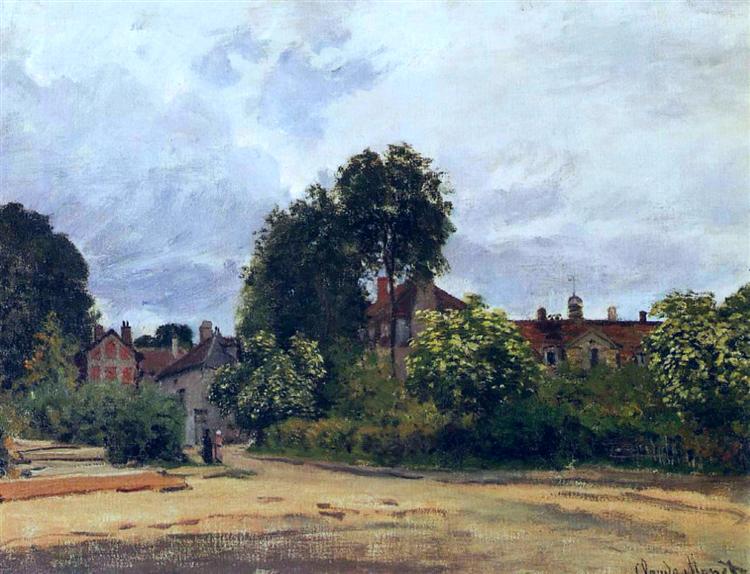Description
L'œuvre "Argenteuil - El Hospicio" de Claude Monet, créée en 1872, fait partie d'une période cruciale de la vie de l'artiste et dans sa relation avec le paysage français et la lumière qui l'entoure. Cette peinture, qui représente une vision de l'hospice d'Argenteuil, est le reflet de la préoccupation de Monet pour l'instant et l'expérience éphémère, les caractéristiques fondamentales du mouvement impressionniste dont il a été pionnier.
Dès un premier coup d'œil, la composition se caractérise par une approche pratiquement panoramique qui capture la construction de l'hospice dans un environnement naturel dynamique. Monet, dans sa recherche pour capturer l'atmosphère des lieux qu'il a peints, utilise une structure qui donne un sentiment de fluidité et de temporalité. L'arrangement des éléments de l'œuvre invite le spectateur à contempler non seulement le bâtiment lui-même, mais aussi leur relation avec l'environnement. L'inclinaison des lignes de soins palliatifs et la façon dont le paysage environnant suggère un dialogue constant entre la construction et la nature.
La palette de couleurs est un aspect qui mérite une attention particulière. Monet s'éloigne de la précision chromatique de la peinture académique pour introduire une gamme de tons doux et lumineux qui évoquent la lumière du soleil rebondissant sur les surfaces. Les nuances du bleu du ciel et l'utilisation du blanc reflètent la couleur des murs de l'hospice, tous enveloppés dans une atmosphère éthérée qui capture la vibration de l'air. Cette utilisation de la couleur définit non seulement la scène, mais transmet également un sentiment de sérénité et de paix, les caractéristiques que Monet recherchait souvent dans ses représentations de la vie quotidienne.
Bien qu'il n'y ait pas de personnalités humaines importantes dans l'œuvre, la représentation du bâtiment parle de l'histoire sociale et culturelle de l'environnement dans lequel Monet a travaillé. Argenteuil, une banlieue de Paris, était à l'époque un centre d'activité pour les impressionnistes, qui étaient attirés par leur paysage naturel et sa proximité avec la capitale. L'absence de personnages ajoute un sentiment d'introspection à la peinture, permettant au spectateur de se plonger dans la contemplation du paysage et de la lumière sans distractions.
Monet exécute la technique de coup de pinceau lâche qui le caractérise, créant un effet de mouvement et de vie qui semble capturer l'air du moment. Chaque ligne est délibérée, mais en même temps spontanée, et lorsque vous voyez de près, vous pouvez voir comment les couches de peinture créent une texture riche qui donne de la profondeur à l'œuvre. Cette technique sera l'un des timbres distinctifs de Monet, qui, à travers son style, cherche à capturer des changements subtils de la lumière et du temps.
"Argenteuil - El Hospicio" est un témoignage non seulement du talent technique de Monet, mais aussi de ses efforts pour exprimer une nouvelle façon de voir et de ressentir. L'œuvre est emblématique de son engagement envers la capture du moment et de la splendeur du paysage, et est présentée comme un tournant qui espère émerveiller les spectateurs contemporains. Dans son essence, cette image invite la réflexion sur le passage du temps et la valeur que l'impressionnisme a accordée à la perception personnelle de l'environnement, établissant Monet non seulement comme un maître, mais aussi en tant qu'innovant dans l'histoire de l'art.
KUADROS ©, une peinture célèbre sur votre mur.
Peintures à l'huile fabriquées à la main, avec la qualité des artistes professionnels et le sceau distinctif de KUADROS ©.
Service de reproduction des images avec garantie de satisfaction. Si vous n'êtes pas complètement satisfait de la réplique de votre peinture, nous remboursons votre argent à 100%.

